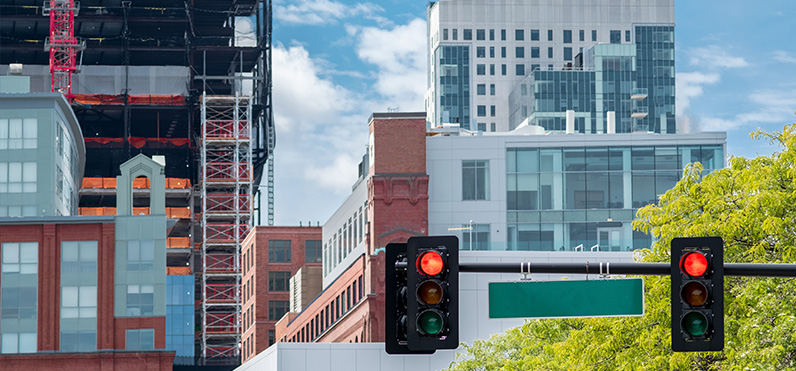Oct 27,2020
The Boston City Council is currently working on a zoning amendment that would integrate fair housing and equity-based analyses into the Article 80 development process for large scale projects. Councilor Edwards, who filed the amendment and chairs the committee on government operations, has held a series of working sessions, most recently on October 8, 2020, to work though code language and attendant assessment tools to aid in the ultimate implementation. There seems to be an agreement from the Boston Planning & Development Agency and the Walsh Administration to the overall framework of the amendment and it is possible that we will see a zoning amendment approved by the Zoning Commission as early as year-end.
There seems to be an agreement from the Boston Planning & Development Agency and the Walsh Administration to the overall framework of the amendment and it is possible that we will see a zoning amendment approved by the Zoning Commission as early as year-end.
What would the Zoning Amendment Do?
Presently the Article 80 process has codified a series of factors in connection with the development review process for most large-scale projects that must be studied and mitigated including a project’s impacts on transportation, the environment, the public realm and historic resources. The proposed amendment would engrain an analysis of fair housing impediments, including current displacement risk data and historical exclusion information, for most large projects and projects in Planned Development Areas, and require developers to commit to development and marketing plans to work to address housing discrimination and segregation.
What Does It Mean to Affirmatively Further Fair Housing?
The proposed amendment includes language requiring developers to “affirmatively further fair housing.” This language comes from the Fair Housing Act and means that it is simply not enough to prohibit housing discrimination and that there is an obligation to take steps to affirmatively dismantle housing barriers for those who have historically been underserved or marginalized such as people of color, immigrants, families with children and people with disabilities. At its most basic, the proposed amendment here would require developers to consider the impact the proposed development will have on the existing community as well on local businesses and create a plan for measures/actions that will be done to preserve that existing community and eliminate barriers for people who historically have not had an opportunity to live there. The measures or actions that the developer could incorporate in its plan for development could include, for example: increasing the percentage of income-restricted units above what is required under the City’s inclusionary development policy (IDP) in the project, designing the project to include more accessible units or family-sized units, increasing access for first-time homebuyers, limiting non-owner occupied units, investing in the local community and local housing preservation, providing more elderly housing options or creating spaces for local/small business. Fair housing measures would likely also include specific marketing plans to keep and bring people to the project and project area who have not historically had the opportunity to live there.
How Might it be Implemented and Become Part of Development Review?
At present, the implementation of such an amendment contemplates the formation of a new committee that would provide historical exclusion analysis and displacement data and steer the developer/project proponent through the fair housing assessment. In that sense, the proposed interagency fair housing committee might function much like the Interagency Green Building Committee (IGBC) which reviews a project to determine whether it is consistent with Article 37 and complies with related climate, sustainability and resilience policies to ensure that major buildings are planned, designed, constructed and managed to minimize adverse environmental impacts and to promote sustainable development. The interagency fair housing committee would review the project and its plan to ensure that developments are planned, designed, constructed and managed to promote a racially, ethnically and economically integrated community. The City Council is drafting an assessment tool and plan that developers/project proponents would need to complete and there would be an iterative process with the committee to arrive at a mitigation plan or package to address the fair housing impediments unique to that proposed development’s site. The interagency fair housing committee would then recommend whether the project can move on based on the mitigation package or action plans proposed. It is anticipated that the committee would not have a formal “vote” on the project and could include agency participation from the Boston Planning & Development Agency (BPDA), Office of Fair Housing and Equity (OFE), Department of Neighborhood Development (DND), Mayor’s Commission of Persons with Disabilities, Office of Equity and other stakeholder offices.
How Might Fair Housing Commitments and Obligations be Enforced?
Ultimately, the plan to affirmatively further fair housing would likely be adopted as part of a cooperation agreement with the BPDA or through another, similar form of agreement with other agency or agencies of the City of Boston which have the ability to enforce its terms if the project is approved.
When Could we see a Zoning Change and Implementation of a New Amendment?
How soon it would take effect and how it would impact projects under review and consideration remain to be determined. Once the City Council votes to approve the amendment it will go to the BPDA for presentation and vote by the Zoning Commission. A vote on a revised text amendment to legally codify the requirement may be completed more quickly while the implementation documents and formation of relevant committee and tasks may take more time to fully form. MBM will continue to watch this development and provide updates.


